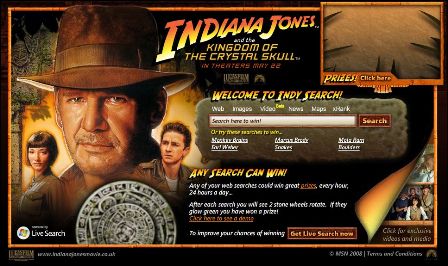“Despite our best efforts, including raising our bid by roughly $5 billion, Yahoo! has not moved toward accepting our offer. After careful consideration, we believe the economics demanded by Yahoo! do not make sense for us, and it is in the best interests of Microsoft stockholders, employees and other stakeholders to withdraw our proposal,” said Steve B.
Read the press release and Steve ballmer’s letter to Jerry Yang here!

The Microsoft Live Search team have teamed up with George Lucas to skin our search engine with an experience of the new Indian Jones and the Kingdom of the Crystal Skull starring Harrison Ford.
Indy Search gives you the chance to win prizes while you look for stuff on the web.
Check out www.indysearch.co.uk and get winning!!!!
I’ve written a couple of pieces on the adCenter PPC Blog and the Analytics Blog in the last couple of days.
Check ’em out…
Now off to Dorset now to visit my friend Ed Found who owns a restaurant in Dorchester and we’re staying in his Dorset guest house which looks fabulous.

Yes that’s right!
If you’re a student or work in a school or college and have a “.ac.uk” email address you can apply for The Ultimate Steal and get Office 2007 for just £38.95
Check it out here: www.theultimatesteal.co.uk
Hurry because the offer ends on 30th April 2008!!!!
![]()

I’ve known Brian Clifton since we were asked to speak at the Reykjavik Internet Marketing Conference in Iceland in 2006.
Passionate, articulate and highly intelligent (well he has got a PHD!) Brian has done much for the online advertising industry, preaching the importance of the sometimes misunderstood and underutilised discipline we call web analytics.
Today is Brian’s last day as Head of Google Analytics in EMEA, and he’s kindly agreed to this exclusive interview where he reflects on what he’s achieved, why he’s leaving and what he’s going to do!
You joined Google in 2005 to “define, develop and lead Google Analytics into EMEA” – How successful do you think your team has been in spreading the word?
Web Analytics is a completely different industry now compared to then. It really is amazing how fast things have moved on. What used to be a niche industry with just a few thousand active participants (bloggers, event speakers, consultants, analysts etc.) has now become almost mainstream. That is, an integral part of online marketing with participants now in the millions world-wide. I think it is safe to say that Google has been the driver of this change with my team helping large European advertisers with their adoption.
I’m someone new to championing web analytics in the internet marketing community via the adCenter Analytics Blog – what’s the secret to capturing website owner’s imagination and persuading them that web analytics should be a critical part of their strategy?
Monetization. That is, the value that measurement can bring. I always use a couple of slides at the beginning of my presentations illustrating a theoretical before and after effect of increasing your conversion rate by 1 percent. It always gets the audiences attention and sets the scene for why website owners should invest in measurement.
Why does all that data make people’s eyes glaze over? How can we make it easier for people to understand?
That’s traditionally been a common complaint from a lot of web analytics users. Web visitor data can feel overwhelming simply because the volume is high after all it is so easy and inexpensive to collect.
The Google philosophy has always been one of “data democratisation”. That is, unlocking tools from the exclusive realm of small specialist departments, and instead empowering all uses with data that they can hopefully contribute to the improvement of. After all, we are all web users, so we can all suggest improvements. Often the collected knowledge of the many can exceed that of the few available experts
Can you give us 3 top tips or things to look out for when analysing website traffic?
The single most important thing is to have a complete best practice implementation of your web analytics tool. Otherwise its “garbage in, garbage out”. It never ceases to amaze how much money organisations are prepare to spend just on ‘having’ a tool and yet do not invest on installing it to its full potential – so that they can actually do something with the data.
With good, clean data coming in, start looking for engagement points on your website. Apart from goal conversion rates, time on site and bounce rates are excellent top level indicators of success, or not. These can be used as your benchmarks for improvement.
If you have a site search feature on your site (internal search engine), analyse the keywords used by your visitors. This can provide invaluable insight as to what your visitors actually want from you, so that you can determine whether this aligns with your marketing message. What’s great about performing site search analysis is that visitors are using in their own terminology – it removes the guess work for marketers. It can also provide feedback for future product features – perhaps you were not aware that a significant proportion of visitors also want your specialist widget in metallic blue!
Today is your last day at Google – Why on earth are you leaving? It’s not the falling share price is it?
LOL, remember I joined Google in 2005, post IPO! In fact the beauty of working with a product that is free, is that its given me the freedom to build a team of product experts rather than sales managers. That’s a pretty unique position for anyone to be in and one that I feel immensely privileged to have been a part of.
Unfortunately that is also the caveat of being a manager – as your team grows you move further away from client interactions which is the part that most excites me. In fact, the vast majority of web content is made up of poorly optimised websites. By that I mean poorly optimised for visibility (visitors can’t find you via the search engines) and poorly optimised for the user experience (leading to low conversion rates). These two are closely related and web analytics is the key to unlock the potential of both.
Therefore from April 7th, I am happy to announce that I will be the Senior Strategist for Omega Digital Media – the company I founded back in 1997 that specialises in search integration and conversion marketing. They have been an official analytics partner for Google for many years (that’s how I got recruited by Google!), so the connection continues. I will be focusing my efforts on providing the service needed to help clients grow their business by making web analytics central to their strategy.
So your new book that you were plugging at Search Marketing World in Dublin yesterday, is it all about GA or can readers read the techniques and tips and apply them with other analytics solutions – like Microsoft adCenter Analytics for instance?
The book is entitled Advanced Web Metrics for Google Analytics, but is actually aimed at a broad audience – essentially anyone with an interest in making their web site successful. That includes website owners, marketers, web designers/developers, content creators, PR departments and all the various intermediaries. Its about measuring for success (the title of the first chapter) and applies best practice techniques on how to do so using Google Analytics.
There are of course some chapters specific to GA, but to be honest there is a great deal of feature parity out there among the various other vendors. So yes, it is possible to use the principals that I describe for any enterprise class analytics tool – including Microsoft’s adCenter Analytics which I even use on my own blog.
Thanks Brian and good luck with the book and the new venture!
An amusing clash of cultures over on the Community Forum…
Wednesday night saw Microsoft show some of the delegates/speakers from Search Engine Strategies New York 2008 a good time.
It was all to celebrate the launch of our new adCenter Blogs and Forums

The Bus Driver

The Anticipation!

Times Square in the Rain 🙁

Jeremiah Andrick – Cindy Krum – Richard Zwicky

David Szetela & Kristjan Mar Hauksson & Partners

Counting Cards

Jill’s Mean Backhander

Warming Up For Karaoke 🙂

adCenter411 Incognito

Fabulous Food….

Beautiful people!

Chips Are Down

Tamar Weinberg & Jonathan Hochman

Lady In Blue

JenStar – Lorna – Danny Sullivan

Me Carefully Whispering


Jason Yormark Wearing Some Billie Jeans


SMO New York – New York

Matt McGowan & Friend

Kevin Ryan & Rory Brown Outside SearchBash

3am – Time for bed!?
Very excited to say our new site for the adCenter Blogs & Forums is now live at www.adCenterCommunity.com
There you’ll find all the lates news, views, tips, tricks and best practices and forms including:
Check them out, register, get involved and give us your feedback….. 🙂
If this site has piqued your interest in hiring Mel, either as a speaker for your event or as a consultant for your business, contact him now to start a conversation about how he can help...
Get in touch with Mel